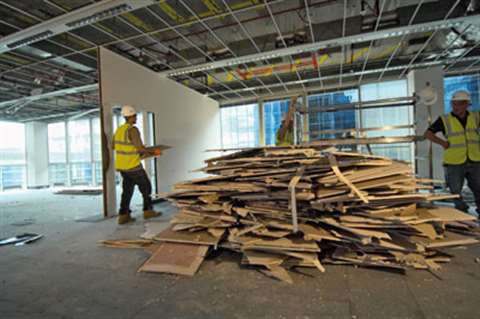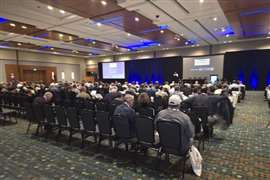Making the most of waste plasterboard
08 December 2009

The UK construction and demolition industries could be saving over £8.2 million (US$13.6 million) each year by diverting more of the waste plasterboard they generate away from landfill and back into the production of useful materials.
The introduction of a new Quality Protocol by the Waste Protocols Project - a joint Environment Agency and WRAP (Waste & Resources Action Programme) initiative - could help the demolition industry realise some of these savings.
Here joint project executives Mervyn Jones (WRAP) and Martin Brocklehurst (Environment Agency) explain how…
The demolition industry is one of the major generators of waste plasterboard in the UK, disposing of between 800,000 and 1,300,000 tonnes of this material every year.
But of this, only around 131,000 tonnes are currently being recycled, which means a large proportion of this valuable resource is typically sent to landfill.
Until relatively recently demolition businesses were still able to landfill waste plasterboard under the ‘10 per cent' rule set by the Environment Agency for England and Wales.
However, since 1st April 2009 the guidance has been revised, and all gypsum waste sent to landfill must now be deposited in a separate mono-cell with non-biodegradable waste.
This has left the demolition industry facing disposal costs of £90-150 (US$150-250) in gate fees, landfill tax and transportation expenses for every tonne of material they dispose of.
At a time when business efficiency is vital, the introduction of the Quality Protocol for the production of gypsum from waste plasterboard could not be more welcome.
The protocol sets end-of-waste criteria for the production of recycled gypsum from waste plasterboard. By establishing this criteria and assuring standards, the Quality Protocol will not only help the industry save money in the form of disposal costs, but also make it easier for businesses in the UK to manufacture and use recycled gypsum made from waste plasterboard.
But what does this actually mean for the demolition industry?
Recycled gypsum made in accordance with the protocol becomes a quality assured, non-waste product; free from the need for waste management controls, and fit-for-purpose for a range of end-user industries.
By reducing the amount of regulations producers and users of recycled gypsum have to deal with - and by helping to raise quality - the protocol will increase industry confidence in products made from the material.
This means end users such as plasterboard and cement manufacturers will be more likely to buy recycled gypsum that is no longer considered ‘waste' because of the time and money savings inherent in not having to comply with waste legislation.
In fact, it is anticipated that increased demand for Quality Protocol compliant recycled gypsum will help producers realise an additional £10.9 million (US$18 million) in sales over the next 10 years.
Greater demand for recycled gypsum will help to create a stronger market, and provide generators of waste plasterboard with a viable alternative to sending their material to landfill.
This will allow businesses to realise significant cost savings - it has been estimated that the construction and demolition industry could save over £8.2 million (US$13.6 million) a year if the waste plasterboard it generates was sent for recycling rather than to landfill.
In total, it is estimated that the increased market confidence and savings for end users and waste generating industries that will result from the introduction of the Quality Protocol will realise a net benefit of over £38 million (US$63 million) over the next 10 years.
A strong market for recycled gypsum is good news for the demolition industry as it means that more waste plasterboard can be diverted away from landfill.
This is beneficial for the environment but, even better, it allows businesses generating waste plasterboard to realise considerable cost savings.
To be Quality Protocol compliant recycled gypsum must be produced in accordance with British Standards Institution's Publicly Available Specification (PAS 109:2008). More information about this specification can be found on the WRAP website, www.wrap.org.uk.
The Quality Protocol for the production of gypsum from waste plasterboard can be downloaded from the Environment Agency website at www.environment-agency.gov.uk
CONNECT WITH THE TEAM








